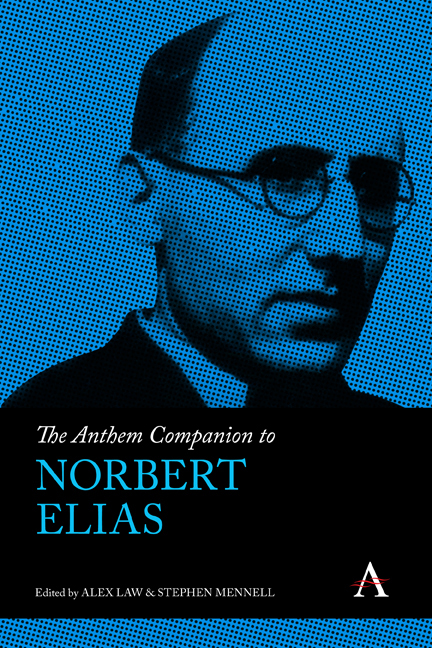Book contents
- Frontmatter
- Contents
- Notes On Contributors
- Acknowledgments
- Introduction: The Sociological Promise of Norbert Elias
- One Norbert Elias: Genesis of a Determined Thinker
- Two Knowledge, Science and Method: The Sociological Practice of Norbert Elias
- Three Norbert Elias’s Comparative Historical Sociology: Against Process Reduction
- Four Power and Process: Norbert Elias and the Paradox of Inequalities
- Five Norbert Elias and Shifting Gender Relations
- Six Travelling With Elias: Figurations and the Racialising Process in South Africa
- Seven Excitement Processes, Embodiment and Power Relations in Sport and Leisure
- Eight Warfare, Survival Units, National Habitus and Nationalism: Norbert Elias’s Contribution to Political Sociology
- Nine Elias’s Contribution to International Relations Theory: Towards a Global Sociology
- Ten Crime, Government and Civilisation: Rethinking Elias in Criminology
- Eleven Art and the Civilising Process
- Twelve From Social Mobility to Channels of Opportunity: Norbert Elias and Education
- Appendix: Published Works of Norbert Elias in English
- Index
Five - Norbert Elias and Shifting Gender Relations
Published online by Cambridge University Press: 28 February 2024
- Frontmatter
- Contents
- Notes On Contributors
- Acknowledgments
- Introduction: The Sociological Promise of Norbert Elias
- One Norbert Elias: Genesis of a Determined Thinker
- Two Knowledge, Science and Method: The Sociological Practice of Norbert Elias
- Three Norbert Elias’s Comparative Historical Sociology: Against Process Reduction
- Four Power and Process: Norbert Elias and the Paradox of Inequalities
- Five Norbert Elias and Shifting Gender Relations
- Six Travelling With Elias: Figurations and the Racialising Process in South Africa
- Seven Excitement Processes, Embodiment and Power Relations in Sport and Leisure
- Eight Warfare, Survival Units, National Habitus and Nationalism: Norbert Elias’s Contribution to Political Sociology
- Nine Elias’s Contribution to International Relations Theory: Towards a Global Sociology
- Ten Crime, Government and Civilisation: Rethinking Elias in Criminology
- Eleven Art and the Civilising Process
- Twelve From Social Mobility to Channels of Opportunity: Norbert Elias and Education
- Appendix: Published Works of Norbert Elias in English
- Index
Summary
‘Together with self-control and societal connectedness, a third ideal came under attack: marriage and family life, which had done so much to domesticate male violence in the preceding decades’.
(Pinker 2013)Introduction
Pinker's stark remark can introduce an everyday topic that in long-term processes is a permanent source of contention in relations between the sexes, in political or business life as well as in romantic or sex life. In his book The Better Angels of Our Nature, Pinker (2013) very convincingly states that in Western societies we can observe a decline of violence. He uses long-term data to demonstrate that over the long-run violence has, astonishingly, declined in human civilisation in spite of wars, terrorism and genocide. Besides men, who he implies are the aggressors, women especially are conceived as central to this process; a gendered process that is worth reconstructing, not only because Pinker's thesis is rather simplistic, but because Western gender orders are subject to wide social, national and historical variations. So, although at first impression this remark seems very convincing, a more detached approach shows its narrowness. Firstly, for centuries it was mostly women who had to pay the price, with extreme self-control and subordination in marriage and public life, as the very precondition of the (male) civilising processes. Secondly, life for educated and non-educated men and women differed in many ways, as not everybody had the right to marry. Thirdly, constructing women as the ‘peaceful angels of civilisation’ neglects her story with its ups and downs of increasing and decreasing power chances. And last but not least, this construction completely ignores diverse forms of sexual orientation that took place outside of the marriage unit. This could be a first, more or less, feminist reaction to Pinker’s statement focusing on its male bias. Moreover, to argue from modern gender research, we see that gender relations have become flexible throughout the last 40 years and that traditional patriarchal gender orders have been eroded (Walby 1997; McRobbie 2009). For example, the shock of the sudden Covid-19 health crisis, at first sight, seems to have been managed in favour of the traditional model of production and reproduction that was believed to have been overcome.
- Type
- Chapter
- Information
- The Anthem Companion to Norbert Elias , pp. 91 - 110Publisher: Anthem PressPrint publication year: 2023

